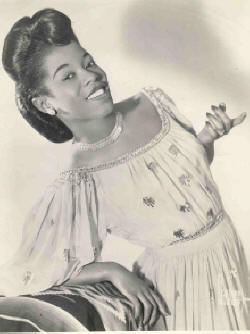

 Marie Knight (June 1, 1920 – August 30, 2009)[1] was an American gospel and R&B singer.
Sister Rosetta Tharpe,
who had a rumored romantic relationship with singer Marie Knight, among other
women, also might have been bisexual or queer.
Marie Knight (June 1, 1920 – August 30, 2009)[1] was an American gospel and R&B singer.
Sister Rosetta Tharpe,
who had a rumored romantic relationship with singer Marie Knight, among other
women, also might have been bisexual or queer.
Marie Knight was born Marie Roach[2] in 1920,[3][1] though she claimed to have been born in 1925.[4] Sources differ as to her place of birth – either Attapulgus, Georgia,[1] or Sanford, Florida[5] – but she grew up in Newark, New Jersey. Her father was a construction worker and the family were members of the Church of God in Christ.[2] She first toured as a singer in 1939 with Frances Robinson, an evangelist. She married preacher Albert Knight in 1941 but the union ended in divorce. While she was touring with Sister Rosetta in the 1940s, her two children died in a fire at her mother's house in New Jersey.[2][3] In 1946, she made her first recordings, for Haven Records with the masters soon purchased by Signature Records,[6] as a member of The Sunset Four (aka The Sunset Jubilee Singers). Shortly afterwards, Sister Rosetta Tharpe saw her singing at the Golden Gate Auditorium in Harlem, on a bill with Mahalia Jackson, and invited Knight to join her on tour.[2] Tharpe recognized "something special" in Marie's contralto voice.[3] She continued to record and perform with Tharpe through the 1940s, sometimes acting out the parts of "the Saint and the Sinner", with Tharpe as the saint and Knight as the sinner.[2] Among their successes were the songs "Beams of Heaven", "Didn't it Rain", and "Up Above My Head", recorded for Decca Records. "Up Above My Head", credited jointly to both singers, reached No. 6 on the US R&B chart at the end of 1948, and Knight's solo version of "Gospel Train" reached No. 9 on the R&B chart in 1949.[7] She left Tharpe to go solo around 1951, and put together a backing group, The Millionaires (Thomasina Stewart, Eleonore King and Roberta Jones), with whom she recorded the 1956 album Songs of the Gospel.[2] She began recording secular R&B music in the late 1950s, for various labels including Decca, Mercury, and Okeh. Her duet with Rex Garvin, credited as Marie & Rex, "I Can't Sit Down" released on the Carlton label, reached No. 94 on the pop chart in 1959.[8][9] In the late 1950s she also toured Britain as a guest of Humphrey Lyttelton.[2] In 1961 she recorded the single "Come Tomorrow", which was later a hit for Manfred Mann.[10] Knight's version of "Cry Me a River" reached No. 35 on the U.S. Billboard R&B charts in 1965.[11] She toured with Brook Benton, the Drifters, and Clyde McPhatter, and regularly reunited onstage with Tharpe.[3] She remained friends with Tharpe, and helped arrange her funeral in 1973. In 1975, having given up performing secular music, she recorded another gospel album, Marie Knight: Today. In 2002, Knight made a comeback in the gospel world, recording for a tribute album to Tharpe. She released a full-length album, Let Us Get Together, on her manager's label in 2007.[2]
Marie Knight died in Harlem of complications from pneumonia, on August 30, 2009, aged 89. She was survived by a sister, Bernice Henry.[3]
My published books: